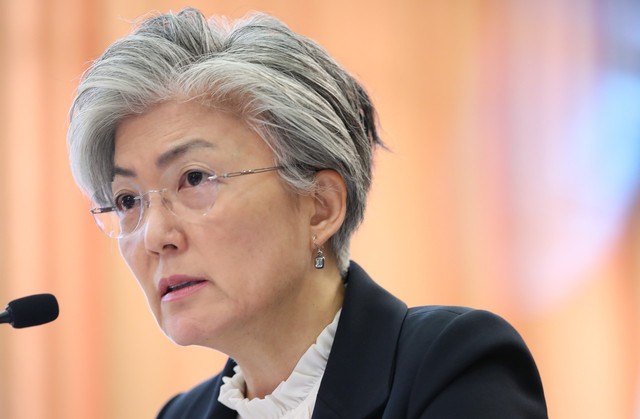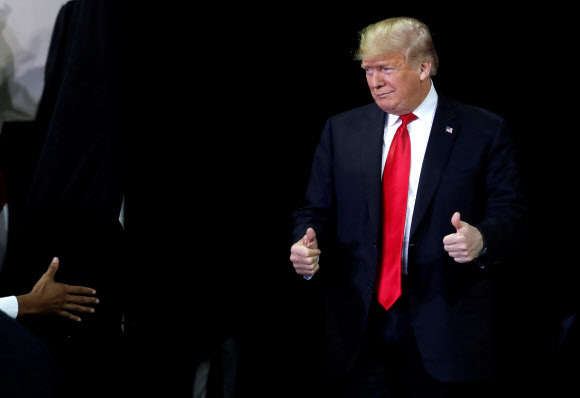Posted on : Oct.12,2018 17:55 KST
Modified on : Oct.12,2018 18:05 KST
 |
|
South Korean Minister of Foreign Affairs Kang Kyung-wha answers questions at a parliamentary audit hearing by the National Assembly’s Foreign Affairs and Unification Committee on Oct. 10 at the Ministry of Foreign Affairs in Seoul. (Yonhap News)
|
A fierce controversy is raging over South Korean Foreign Minister Kang Kyung-wha’s remarks about reviewing the May 24 Measures. The ruling and opposition parties’ battle over Kang’s comments continued on Oct. 11. The controversy also appeared to be spreading overseas, with US President Donald Trump weighing in by saying that South Korea would need US approval. While Kang’s remarks are problematic, Trump’s remarks appear even more inappropriate, since they may impinge on South Korea’s sovereignty.
It’s clear that the cause of this controversy can be traced back to Kang. On Oct. 10, Kang responded to a question by Democratic Party leader Lee Hae-chan about whether the government was willing to revoke the May 24 Measures by saying, “I’m told that this is under review with related ministries.”
When asked whether tourism to Mt. Kumgang was blocked by the May 24 measures, Kang said that that’s the case. Kang’s remarks are problematic for two reasons. First, they contain factual errors. The May 24 Measures were adopted by the government of former president Lee Myung-bak in response to the sinking of the Cheonan corvette in 2010. As such, they have nothing to do with the suspension of tourism to Mt. Kumgang, which took place after the fatal shooting of South Korean tourist Park Wang-ja in 2008.
Furthermore, Kang spoke as if she were instrumental in reviewing the May 24 Measures even though she’s not the minister responsible for them. After her remarks became an issue, Kang apologized and corrected herself, explaining that an interagency review was not taking place. A basic responsibility of a government minister is to have an accurate understanding of an issue before acting on it or speaking about it. Kang clearly bears some responsibility for the issue blowing up as it has.
Even so, it’s unhelpful for the opposition parties to throw a fit as if lifting the May 24 Measures – which are basically obsolete anyway – were some kind of big deal. Just as disgusting is how much attention some conservative newspapers have paid to the story about US Secretary of State Mike Pompeo complaining to Kang about the inter-Korean military agreement. As long as people think there mustn’t be an iota of disagreement between South Korea and the US, it will be impossible to proactively resolve issues on the Korean Peninsula.
 |
|
US President Donald Trump at a Republican rally in Erie, Pennsylvania, on Oct. 10. (Reuters)
|
Even harder to understand are Trump’s remarks. Trump responded to Kang’s comments about reviewing the May 24 Measures by saying that South Korea won’t lift the sanctions “without our approval.”
This remark can be seen as openly discouraging the improvement of inter-Korean relations. The even bigger problem is Trump’s use of the undiplomatic term “approval.” This comes across as Trump browbeating South Korea to only take actions approved by the US, which can be interpreted as an infringement of the South’s sovereignty.
This could also raise questions about whether Trump regards South Korea as a client state. While the Blue House is taking Trump’s remark to mean that “all matters are conducted through deliberations between South Korea and the US,” the US government needs to be aware that such discourteous remarks could have an impact on South Korea-US cooperation.
It goes without saying that South Korea, as a sovereign state, needs to stay one step ahead on Korean Peninsula issues so as to solicit the support of its neighbors. But given the precarious state of the North Korea-US denuclearization talks, the South Korean government must also handle each matter with the utmost circumspection and care.
Please direct comments or questions to [english@hani.co.kr]










